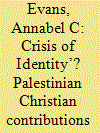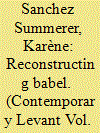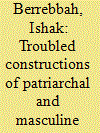|
|
|
Sort Order |
|
|
|
Items / Page
|
|
|
|
|
|
|
| Srl | Item |
| 1 |
ID:
187759


|
|
|
|
|
| Summary/Abstract |
Amman, as the capital of the Hashemite Kingdom of Jordan, has been said to suffer from a crisis of identity, a condition that is seen as impinging a sense of authentic urban memory and form. As it has become the destination of multiple refugee and migrant communities seeking safety in Jordan, Amman’s subsequent migrant make-up has been primarily narrated as a burden – on space, on resources and on understandings of the Jordanian national self-preventing a sense of national unity being found within its capital. Countering these narratives of burden and crises, this paper seeks to reconceptualise the role of migrants in Jordan’s capital as contributing to and participating in the development of Amman as a modern urban centre. By discussing one particular communal group – Palestinian Christians – and their contributions to the socio-spatial fabric of the city this paper aims to promote a shift in narrative around Amman in particular, and Jordan in general, as one which can embrace its history of not only migrating people but their ideas of modernity and urbanity and how they are imprinted on the urban landscape today.
|
|
|
|
|
|
|
|
|
|
|
|
|
|
|
|
| 2 |
ID:
187760


|
|
|
|
|
| Summary/Abstract |
In this article, I argue that the so-called ‘intifada of knives’ in 2015–2016 was not a new phenomenon in the Palestinian resistance. Instead, it paralleled the situation in Gaza in the mid-1980s when Palestinian Islamic Jihad (PIJ) members engaged in similar attacks. What both periods share is the absence of efficient organisational vehicles facilitating a more durable form of collective resistance. This was the case in the mid-1980s because PIJ was yet to develop the effective organisational structures required to facilitate the resistance its members desired, and this was also the case in 2015–2016 because Palestinian youth are largely disillusioned with Palestinian political factions and traditional party politics as arenas to implement change. As these and similar outbursts of violence offer few, or no, principles for political organising for those who follow, what marked the wave of stabbings in the mid-2010s was not the fury with which they were carried out, but rather the rapidity of their collapse. I thus argue that certain organisational principles are required to sustain and prolong any popular protests for a sufficient period.
|
|
|
|
|
|
|
|
|
|
|
|
|
|
|
|
| 3 |
ID:
187761


|
|
|
|
|
| Summary/Abstract |
How was missionary knowledge received and interpreted by scholars and church historians in Europe and Russia? Many late nineteenth and early twentieth-century academics utilised knowledge production from Christian missions, notably by way of scholarly Orientalism. However, the history of this knowledge is also a history of representations: while missionary knowledge helped showcase the cultural and religious traditions of Eastern Christianity, what were the underlying motives and especially the consequences? This article examines the formulation and circulation of Eastern Christian knowledge on either side of the Mediterranean, especially on the basis of Catholic missionary archives and academic productions, the study of which is sometimes rooted in non-Anglophone academic traditions. The aim is to shed light on how knowledge relating to Eastern Christianity was assimilated in Europe, as well as the role missions played in this process, especially from the last third of the nineteenth century, when the institutions and instruments for the circulation of knowledge emerged. Another objective is to address the circulations and transformations of this knowledge on either side of the Mediterranean: collected and developed in major European libraries and universities, it was integrated by the governance structures of churches, but quite often also returned to the space it originated from, where it was reappropriated and gave rise to patrimonial processes, notably alongside the sometimes tragic experiences of certain communities during the end of the Ottoman Empire and the establishment of new states. Christian missions, at the intersection of East and West, were at the heart of this dynamic .
|
|
|
|
|
|
|
|
|
|
|
|
|
|
|
|
| 4 |
ID:
187762


|
|
|
|
|
| Summary/Abstract |
Cars are a central means by which socio-political information is communicated in Lebanese public space, as is the case in other car cultures around the world. In Lebanon, cars are used to perform and reproduce structures of power within the country’s social hierarchy. In recent years, a highly developed system of automobile symbols and meanings has emerged and driving on the Lebanese roads requires that drivers become fluent in this ‘grammar’ of power. This article reconciles the anthropological ‘turn to the state’ with a growing body of literature on automobility in the Middle East and work on the roles of cars in social and political performance in a wide range of other cultural contexts. Following Mitchell’s theorisation of the ‘state effect’, this article argues that it is through this grammar, interpreted every day on the Lebanese roads, that state power is substantiated. However, Lebanese automobiles add a further layer of complexity to the ‘state effect’ by simultaneously drawing attention to the state’s fragmentation and impotency. They highlight other coexisting and competing systems of power. Lebanese drivers are disciplined in interpreting and acting on these signs on a daily basis. This article is an ethnographic account of the language of power embodied by automobiles. It gives a detailed analysis of the information conveyed by four main visual aspects of cars on the Lebanese road and explores the implications for understandings of statehood and power that emerge.
|
|
|
|
|
|
|
|
|
|
|
|
|
|
|
|
| 5 |
ID:
187763


|
|
|
|
|
| Summary/Abstract |
This article introduces the complex and troubled constructions of Arab masculine and patriarchal identities depicted in Laila Halaby’s West of the Jordan, as told from the gaze of the novel’s female protagonists. It suggests that the politics of Arab male characters’ gender identity entail convoluted understandings, projecting them in both the diaspora and the homeland. The analysis in this article put flesh on the bones of some central questions regarding what problematises and affects masculinity and patriarchy in an Arab context. In addition to analytical and critical approaches to the novel, this article relies on a socio-cultural constructionist approach based on the perspectives of critics and theorists such as Raewyn Connell, Fadia Faqir, Fatima Mernissi and Homi Bhabha.
|
|
|
|
|
|
|
|
|
|
|
|
|
|
|
|
|
|
|
|
|